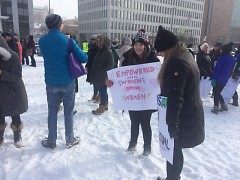Grand Rapids residents flocked to Calder Plaza to participate in the third annual Women's March on January 19, 2019.
Chilly winds and low temperatures did not deter hundreds of women from trekking through the snow. Marchers wearing pink "pussy hats" floated Donald Trump baby balloons, hoisted picket signs with colorful sayings, and waved rainbow flags.
Reports state that turnout for Women's March events across the U.S. dropped this year due to poor weather and charges of anti-Semitic statements made by some organizers.
Despite national concerns, Women's March events took place in major cities across Michigan, including Lansing, Holland, and Traverse City.
Grand Rapids Organizer Raina Cook decided to bring the Women's March to Grand Rapids because she felt sick of the country's toxic political climate. With the help of a team of volunteers, she secured a location, recruited speakers, and generated enthusiasm online.
The Grand Rapids Women's March event was inspired by the mission of the statewide Women's March Michigan, which calls for electoral reform, a $15 minimum wage, and pro-immigration laws.
"We are for a Michigan that reflects and protects all its citizens, that celebrates diversity and nurtures the human potential in each of us," Cook said.
Speakers represented diverse racial identities and socioeconomic backgrounds.
Movimento Cosecha member Idalia Tinoco shared her story of traveling from Mexico to the U.S. with nothing but a pair of shoes. Upon arriving in the U.S., Tinoco opened a restaurant. Tinoco felt that her neighbors still viewed her as an economic burden.
"It's not true that all undocumented people are criminals and bad people," Tinoco said "You have proof right here that when you work hard anything is possible."
Darmesha Glover described her upbringing in a low-income home in Grand Rapids. Glover's mother, who struggled with a neglectful husband, acted as the family's sole breadwinner.
Glover spent much of her time in church. When Glover developed a rebellious streak, male church elders called her a "disobedient child of God."
"When you're a young black girl and you're acting out, you are labeled as a 'troubled child,'" Glover said. "It made me question why things are the way they are."
During college, Glover attempted suicide. Glover gradually recovered from her depression, and she decided to help other vulnerable people by working at an HIV prevention non-profit called the Red Project.
"Black women should be allowed to feel anger, passion, and sadness," Glover said.
Cook said that speakers like Tinoco and Glover would encourage women not only to vote, but deepen their involvement in the community.
The Rapidian, a program of the 501(c)3 nonprofit Community Media Center, relies on the community’s support to help cover the cost of training reporters and publishing content.
We need your help.
If each of our readers and content creators who values this community platform help support its creation and maintenance, The Rapidian can continue to educate and facilitate a conversation around issues for years to come.
Please support The Rapidian and make a contribution today.


